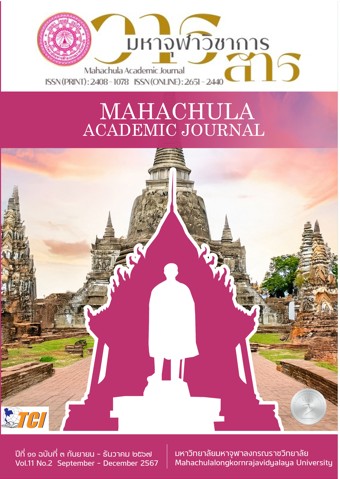The Development of Educational Quality of Life for Underprivileged Children
Main Article Content
Abstract
This article focuses on analyzing approaches to the development of the educational quality of life for underprivileged children. Emphasizing the importance of providing appropriate and equal education. Support from communities and organizations Education is considered an important factor in improving the quality of life in promoting children to develop to their full potential. Promotion to grow into a good, quality person and benefit society as a whole. Education plays an important role in the development of academic and social skills. which is the basis for building a future. However, for underprivileged children Access to education remains a problem.
Especially in rural areas and communities lacking resources. Improving the quality of life therefore requires cooperation from many sectors. From families, communities, schools, and governments, there must be consistent planning and action in all areas. There are various and comprehensive development approaches that will help underprivileged children receive a good education and have more opportunities for their own development.
Article Details

This work is licensed under a Creative Commons Attribution-NonCommercial-NoDerivatives 4.0 International License.
References
ปฏิญญาว่าด้วยสิทธิเด็ก ค.ศ. ๑๙๕๙ (พ.ศ. ๒๕๐๒). The Declaration of the Right of the Child, 1959.
รัฐธรรมนูญแห่งราชอาณาจักรไทย พุทธศักราช ๒๕๖๐. มาตรา ๕๔ ประกอบมาตรา ๗๑ วรรค ๓.
รัฐธรรมนูญแห่งราชอาณาจักรไทย พุทธศักราช ๒๕๖๐. มาตรา ๗๗.
รัชรฐา ปาลกะวงศ์ ณ อยุธยา. “การขับเคลื่อนนโยบายสาธารณะเพื่อสุขภาพแบบมีส่วนร่วมของเครือข่าย
สมัชชาสุขภาพจังหวัดลพบุรี”. วิทยานิพนธ์รัฐประศาสนศาสตรมหาบัณฑิต. บัณฑิตวิทยาลัย: มหาวิทยาลัยมหิดล, ๒๕๕๘.
วาสนา จักรแก้ว, เกศรา สิทธิสันติกุล, สุรชัย กังวล และนิโรจน์ สินณรงค์. “นโยบายการจัดการศึกษาสำหรับเด็กด้อยโอกาสของประเทศไทยและต่างประเทศ”. วารสารมหาวิทยาลัยราชภัฏยะลา. ปีที่ ๑๕ ฉบับที่ ๓ (๒๕๖๓) : ๓๒๘ - ๓๓๔.
วิชัย วงษ์ใหญ่. กระบวนทัศน์ใหม่การจัดการศึกษาเพื่อพัฒนาศักยภาพของบุคคล. กรุงเทพมหานคร: เอสอาร์พริ้นติ้ง, ๒๕๔๓.
ศักดิ์ชัย เลิศพานิชย์พันธุ์ และคณะ. “การศึกษาแนวทางและความเป็นไปได้ในการนำมาตรการลงโทษระดับกลางมาใช้ เพื่อเป็นมาตรการทางเลือกในการลงโทษผู้กระทำผิดในกระบวนการยุติธรรมทางอาญาของไทย”. รายงานการวิจัย. คณะสังคมสงเคราะห์ศาสตร์: มหาวิทยาลัยธรรมศาสตร์, ๒๕๕๑.
สฤณี อาชวานันทกุล. ความเหลื่อมล้ำฉบับพกพา. กรุงเทพมหานคร: เป็นไทยพับลิชชิ่ง, ๒๕๕๔.
สามารถ รุ่งเรืองและประกอบ คุณารักษ์. “รูปแบบการจัดการศึกษาที่ส่งเสริมการพัฒนาคุณภาพชีวิตนักเรียนโรงเรียนมัธยมศึกษา”. วารสารครุศาสตร์จุฬาลงกรณ์มหาวิทยาลัย. ปีที่ ๔๗ ฉบับเพิ่มเติม (เมษายน-มิถุนายน ๒๕๖๒): ๓๗๘-๓๙๐.
สำนักงานเลขาธิการสภาการศึกษา. “รายงานการวิจัยเพื่อจัดทำข้อเสนอเชิงนโยบายการพัฒนาการศึกษาเพื่อสร้างความเป็นพลเมือง”. รายงานการวิจัย. กรุงเทพมหานคร: สำนักงานเลขาธิการสภาการศึกษา, ๒๕๕๙.
สุพรรณิการ์ มาศยคง. “คุณภาพชีวิตในโรงเรียนของนักเรียนมัธยมศึกษาตอนปลายในกรุงเทพมหานคร”. วิทยานิพนธ์วิทยาศาสตรมหาบัณฑิต. บัณฑิตวิทยาลัย: สถาบันบัณฑิตพัฒนบริหารศาสตร์, ๒๕๕๔.
Schmidt, William H., "Equality of Educational Opportunity. Myth or Reality in U.S. Schooling?". American educator. Vol.34 No.4 (2011) : 21.


